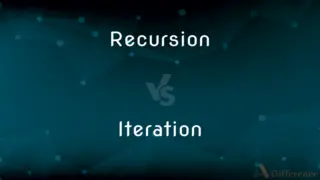Warping vs. Folding — What's the Difference?
Edited by Tayyaba Rehman — By Maham Liaqat — Updated on March 27, 2024
Warping alters a material's flatness due to uneven changes, like in wood or fabric, affecting its original shape, while folding involves intentionally bending or creasing a material into a new shape without altering its flatness.

Difference Between Warping and Folding
Table of Contents
ADVERTISEMENT
Key Differences
Warping is a distortion that occurs when different parts of a material expand, contract, or change unevenly, often due to environmental factors such as moisture or heat. This process is unintentional and usually undesirable, as it can affect the functionality and appearance of materials like wood, metal, or fabric. On the other hand, folding is a deliberate action where a material is bent or creased to change its shape, often without compromising the integrity of the material itself. Folding is common in paper, textiles, and metals for various functional and aesthetic purposes.
While warping results from external conditions acting on the material, causing it to deform in an unplanned manner, folding is typically a controlled process, executed with a specific outcome in mind. For example, warping in wood can occur when it absorbs moisture unevenly, causing it to bend or twist. Conversely, folding paper into origami involves precise and intentional creases to create a desired figure or design.
The effects of warping are generally considered negative, as they can render materials less useful or aesthetically pleasing. Warped wood may not fit properly in construction, and warped fabric may not lay flat or drape correctly. In contrast, folding can be advantageous, allowing for the compact storage of materials, the creation of intricate designs, and the alteration of an object's shape for practical purposes, like folding clothes for packing.
Preventing warping often involves controlling the environment around the material, such as using humidifiers or dehumidifiers, or applying treatments that reduce the material's susceptibility to environmental changes. Folding, however, requires skill and technique to achieve the desired outcome, especially in complex folds or when working with rigid or delicate materials.
The intention behind each process distinguishes them significantly. Warping is an involuntary reaction to external stimuli, while folding is an intentional act of modification. This fundamental difference reflects in the methods used to address or utilize each process. For instance, techniques to prevent or correct warping, such as clamping or using moisture barriers, are preventive or corrective, whereas folding techniques, such as scoring or using templates, are preparatory and creative.
ADVERTISEMENT
Comparison Chart
Nature
Involuntary distortion
Intentional bending or creasing
Causes
Environmental factors, uneven changes
Deliberate action
Effects
Usually undesirable, affects functionality
Can be desirable, changes shape for a purpose
Prevention/Control
Environmental control, material treatment
Technique, skill, tools
Purpose
Unintended, often a problem to be solved
Purposeful, often for design or functionality
Compare with Definitions
Warping
Warping in wood occurs when moisture causes it to bend.
The door frame started warping after the rainy season.
Folding
Folding clothes to fit into a suitcase.
I'm folding my shirts tightly to save space.
Warping
Fabric warps due to uneven shrinkage after washing.
My cotton shirt warped and no longer fits well.
Folding
Folding paper into origami shapes.
She enjoyed folding the paper into a crane.
Warping
Plastic warps when exposed to high heat.
The plastic container warped in the dishwasher.
Folding
Folding a napkin into a decorative shape.
The restaurant folds napkins into elegant swans.
Warping
Warping in metal can happen during improper cooling.
The metal sheet warped after being heated.
Folding
Folding a map to highlight a specific area.
He folded the map to show the route clearly.
Warping
Flooring can warp if exposed to moisture.
The laminate flooring warped near the bathroom.
Folding
Folding metal for a piece of jewelry.
The artisan is folding the metal to create a unique bracelet.
Warping
To turn or twist (wood, for example) out of shape; deform.
Folding
To bend over or double up so that one part lies on another part
Fold a sheet of paper.
Warping
To alter from a normal, proper, or healthy state; twist or pervert
"He was ruthlessly vindictive and allowed personal grudges to warp his political perspective" (Julian E. Zelizer).
Folding
To make compact by doubling or bending over parts
Folded the laundry.
Folded the chairs for stacking.
Warping
To arrange strands of yarn or thread lengthwise onto (a loom) in preparation for weaving.
Folding
To bring from an extended to a closed position
The hawk folded its wings.
Warping
(Nautical) To move (a vessel) by hauling on a line that is fastened to or around a piling, anchor, or pier.
Folding
To bring from a compact to an extended position; unfold
Folded the ironing board down from the wall.
Folded out the map to see where we were.
Warping
To become bent or twisted out of shape
The wooden frame warped in the humidity.
Folding
To place together and intertwine
Fold one's arms.
Warping
To become altered from what is normal, proper, or healthy.
Folding
To envelop or clasp; enfold
Folded his children to his breast.
Folded the check into the letter.
Warping
(Nautical) To move a vessel by hauling on a line that is fastened to or around a piling, anchor, or pier.
Folding
To blend (a light ingredient) into a heavier mixture with a series of gentle turns
Folded the beaten egg whites into the batter.
Warping
The state of being twisted or bent out of shape.
Folding
(Informal) To discontinue operating; close
They had to fold the company a year after they started it.
Warping
A distortion or twist, especially in a piece of wood.
Folding
(Games) To withdraw (one's hand) in defeat, as by laying cards face down on a table.
Warping
A mental or moral twist, aberration, or deviation.
Folding
(Geology) To form bends in (a stratum of rock).
Warping
The threads that run lengthwise in a woven fabric, crossed at right angles to the woof.
Folding
To become folded.
Warping
Warp and woof.
Folding
To be capable of being folded
A bed that folds for easy storage.
Warping
(Nautical) A towline used in warping a vessel.
Folding
(Informal) To close, especially for lack of financial success; fail.
Warping
Present participle of warp
Folding
(Games) To withdraw from a game in defeat.
Warping
An action or motion that warps or twists.
Folding
To give in; buckle
A team that never folded under pressure.
Warping
(geology) the deformation of the Earth's crust over a large area
Folding
To weaken or collapse from exertion.
Warping
The art or occupation of preparing warp or webs for the weaver.
Folding
To place or keep (sheep, for example) in a fenced enclosure.
Warping
The practice of flooding agricultural land with turbid river water to add sediment to the soil.
Folding
The act or an instance of folding.
Warping
The act or process of one who, or that which, warps.
Folding
A part that has been folded over or against another
The loose folds of the drapery.
Clothes stacked in neat folds.
Warping
The art or occupation of preparing warp or webs for the weaver.
Folding
A line or mark made by folding; a crease
Tore the paper carefully along the fold.
A headline that appeared above the fold.
Warping
A moral or mental distortion
Folding
A coil or bend, as of rope.
Folding
Chiefly British A hill or dale in undulating country.
Folding
(Geology) A bend in a stratum of rock.
Folding
(Anatomy) A crease or ridge apparently formed by folding, as of a membrane; a plica.
Folding
A fenced enclosure for livestock, especially sheep.
Folding
A flock of sheep.
Folding
A group of people or institutions bound together by common beliefs and aims.
Folding
A religious congregation
The priest welcomed new parishioners into the fold.
Folding
Designed to fold; as a folding bed, a folding bicycle, a folding chair, etc.
Folding
The action of folding; a fold.
Folding
The keeping of sheep in enclosures on arable land, etc.
Folding
Code folding: a source code display technique that can hide the contents of methods, classes, etc. for easier navigation.
Folding
(geology) the deformation of the Earth's crust in response to slow lateral compression.
Folding
(slang) Paper money, as opposed to coins.
Folding
Present participle of fold
Folding
The act of making a fold or folds; also, a fold; a doubling; a plication.
The lower foldings of the vest.
Folding
The keepig of sheep in inclosures on arable land, etc.
Folding
The process whereby a protein molecule assumes its intricate three-dimensional shape;
Understanding protein folding is the next step in deciphering the genetic code
Folding
The act of folding;
He gave the napkins a double fold
Folding
Capable of being folded up and stored;
A foldaway bed
Common Curiosities
What causes warping in materials?
Warping is caused by uneven changes or environmental factors like moisture and heat.
Why is folding useful in textiles and paper?
Folding is used for functional purposes like storage or aesthetic purposes such as in origami or clothing design.
Can warping be prevented or corrected?
Preventing warping involves controlling environmental conditions and using treatments, while correction may require physical alterations.
Are there materials that are resistant to warping?
Some materials, like certain plastics and metals, are treated or engineered to be more resistant to warping.
Can folding be considered an art form?
Yes, folding techniques like origami are considered art forms, creating intricate designs from paper.
How does warping affect the usability of wood?
Warped wood may not fit properly in constructions or installations, affecting its functionality.
How does folding impact the strength of materials?
Folding can either strengthen materials by creating rigid structures or weaken them at fold lines, depending on the material and fold type.
Is folding always intentional?
Yes, folding is a deliberate action to change a material's shape or for compact storage.
How does the environment affect warping and folding?
Environmental factors like humidity and temperature can cause warping, while folding's effectiveness is usually not affected by the environment but by the material's properties and technique used.
Is it possible to unfold warped materials back to their original shape?
Some slightly warped materials can be flattened with techniques like pressing or steaming, but severely warped items may not be fully restorable.
Does warping occur in digital materials?
In a metaphorical sense, digital warping can refer to distortion in images or sounds, but it's not the same physical process.
What are common methods to prevent fabric from warping?
Using stabilizers, preshrinking before use, and following specific washing instructions can prevent fabric from warping.
What tools are used in folding metals?
Tools like brakes, presses, and hammers are used for folding metals, especially in fabrication.
Can warping be a deliberate artistic choice?
While typically undesirable, some artists deliberately use warping to create unique effects, especially in visual arts.
What's the difference in skill required for warping vs. folding?
Warping is generally unintended and combated with preventive measures, while folding requires skill and precision to achieve desired outcomes.
Share Your Discovery

Previous Comparison
Liquid vs. Aqueous
Next Comparison
Live vs. DwellAuthor Spotlight
Written by
Maham LiaqatEdited by
Tayyaba RehmanTayyaba Rehman is a distinguished writer, currently serving as a primary contributor to askdifference.com. As a researcher in semantics and etymology, Tayyaba's passion for the complexity of languages and their distinctions has found a perfect home on the platform. Tayyaba delves into the intricacies of language, distinguishing between commonly confused words and phrases, thereby providing clarity for readers worldwide.
















































